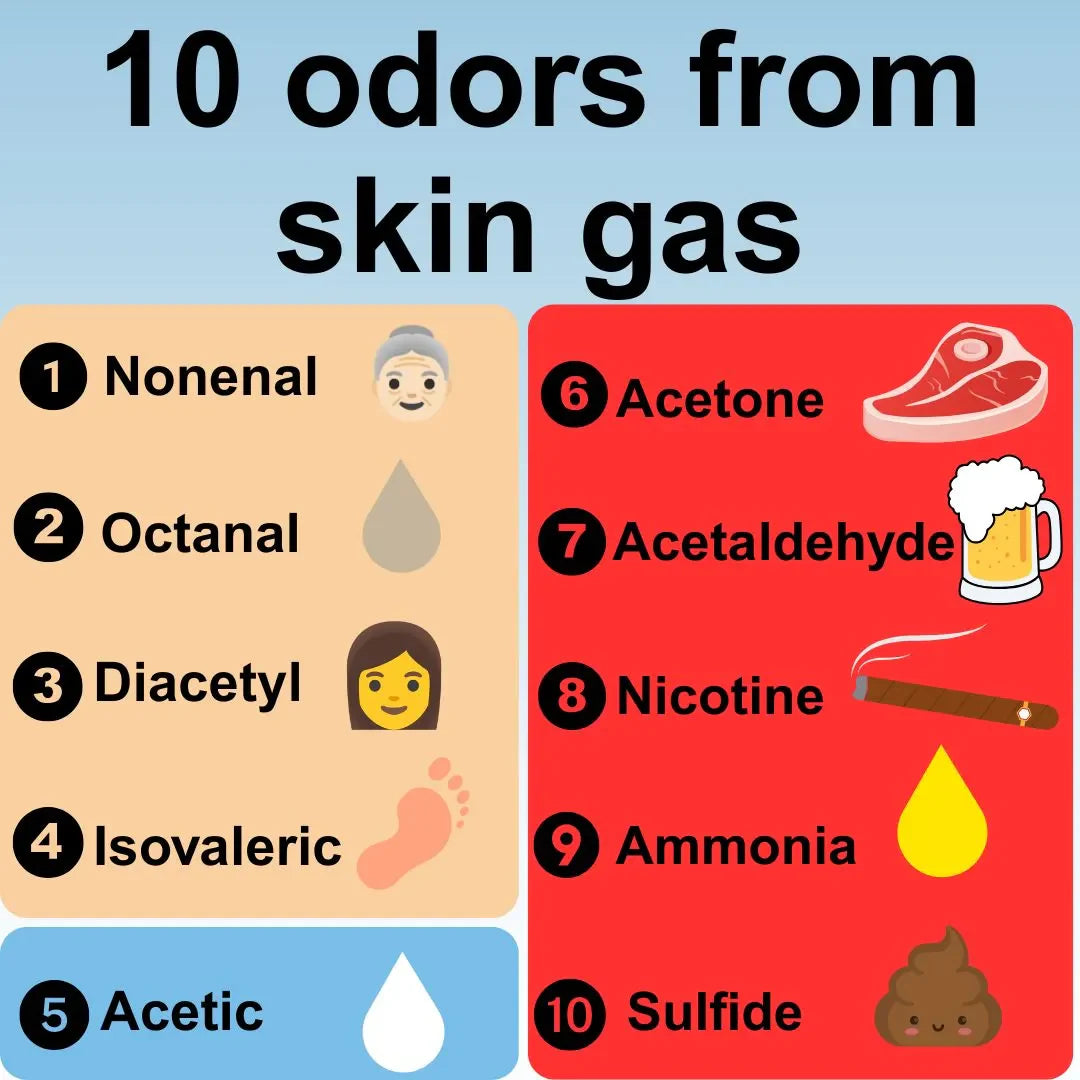
What Is Skin Gas? Why Some Body Odors Stick Around Even After Showering
Share
You Just Showered, So Why Do You Still Smell?
You’ve just stepped out of a hot shower, slipped into clean clothes, and maybe even used your favorite soap. You feel refreshed… but something’s off. There’s still an odor lingering on your skin and no, it’s not your imagination.
If you're over 60 and notice that the "clean" feeling doesn’t last like it used to, you're not alone. As we age, our skin changes in ways that regular soap can't always keep up with. One of the biggest culprits? Skin gas is a surprising source of body odor that can’t always be washed away with ordinary cleansers.
What Is Skin Gas?
“Skin gas” is a term used to describe odor-causing compounds that come out through your skin, not just from sweat, but from oil (sebum), metabolic processes, and even your blood. These odors aren’t caused by poor hygiene. In fact, they’re often the result of natural aging, dietary habits, stress, or hormonal shifts.
10 Most Common Smells You Might Have
As we get older, our bodies release different kinds of skin gases, which are chemicals that cause odors and come from skin oil, sweat, and even our blood through metabolism. Scientists have found 10 main skin gases, each with its own source, smell, and way to get rid of it.
If you're over 60 and have body odor that doesn't go away with regular soap, knowing what these smells mean can help you deal with them better. Let's look at different types and how they come about.
1. 2-Nonenal - The “Aging Odor” 
This is the most recognizable age-related odor. It smells greasy or metallic and resists traditional soap. 2-Nonenal is why many people over 60 notice lingering odors even after washing.
2. Octanal - Waxy or Citrus-Like Smell 
Another byproduct of sebum oxidation, Octanal, clings to skin unless removed with deep-cleansing agents.
3. Diacetyl - Buttery, Sour Odor 
Caused by bacteria breaking down oil in neglected areas like behind the ears or skin folds. Enzyme-based or antibacterial soaps work best here.
4. Isovaleric Acid - "Cheesy" Smell 
Commonly from feet and underarms. Caused by bacteria breaking down sweat and dead skin. Antibacterial soap is your best defense.
5. Acetic Acid - Vinegar-Like Odor 
Linked to stress or workouts. A strong sour smell that’s manageable with regular hygiene.
6. Acetone - Nail Polish Remover Smell 
Common with low-carb or keto diets. When your body burns fat for energy, it releases ketones like acetone. Since it comes from within, soap alone won’t remove it.
7. Acetaldehyde - Alcohol-Like Scent 
A sour, boozy smell that appears when your body breaks down alcohol. It can linger more as your liver slows with age. Soap may help a little, but it won’t remove the source.
8. Nicotine - Smoky or Stale Smell 
Nicotine and smoke compounds can seep out through skin oils and sweat. Soap can reduce the smell, but quitting or detoxing works best.
9. Ammonia - Sharp, Urine-Like Odor 
A strong, chemical scent that shows up when you're dehydrated, stressed, or eating a lot of protein. It’s your body releasing excess nitrogen.
10. Sulfide - Rotten Egg or Bathroom-Like Smell 
Smells like sulfur, eggs, or even a faint bathroom odor. Often comes from sulfur-rich foods, meds, or slow digestion. Soap helps, but diet and gut health matter more.
Do you still smell after taking a shower?
If you’ve ever asked yourself, “Why do I still smell even after using strong soap?” or “Why does my skin smell different now that I’m older?” you’re not imagining it.
As we age, our skin’s natural processes slow down. Sebum the oil your skin produces, oxidizes more easily, and that can lead to a new kind of body odor. Regular soap or floral-scented body wash might cover it up for a short time, but it doesn’t break down the real cause, especially a compound called 2-Nonenal, which is linked to age-related odor.
What kinds of skin odors can soap actually wash away?

Some odors, like those caused by sweat or surface bacteria, wash off easily with regular soap. But deeper, more persistent smells, especially those caused by changes in skin oils and metabolism, often need something more targeted.
Why Nonenal® Soap Gets Rid of Those “Old” Smells
Regular soaps aren’t designed to remove 2-Nonenal, the odor that tends to show up more after 40, and especially after 60. That’s why we created Mirai Clinical Deodorizing Soap.
Our formula is powered by Japanese persimmon extract, which works at the molecular level to neutralize odor not just mask it. Persimmon is also rich in antioxidants, helping support skin that’s becoming more delicate with age. And with no harsh chemicals, it’s gentle enough to use every day.
People love it because it helps them feel truly clean and more confident.
Skin gas is real, but you can manage it.
Getting older brings wisdom, perspective, and sometimes a few unexpected changes like noticing your skin smells different than it used to. That doesn’t mean you’re dirty or doing something wrong. It just means your body’s biology is shifting.
If you’re noticing:
-
Odor returns quickly after a shower
-
A new smell that’s metallic or greasy
-
Comments from loved ones like “there’s a different smell”
…it might be time to try a soap made for this stage of life.
Ready to feel fresh again?
Mirai Clinical’s Nonenal® Soap with Persimmon is Japan’s best soap for aging-related odor. Trusted by thousands of people over 60, it’s a gentle, effective way to take back control of how you feel and how you smell. Backed by Japanese skincare science, it’s a small change that can make a big difference.
